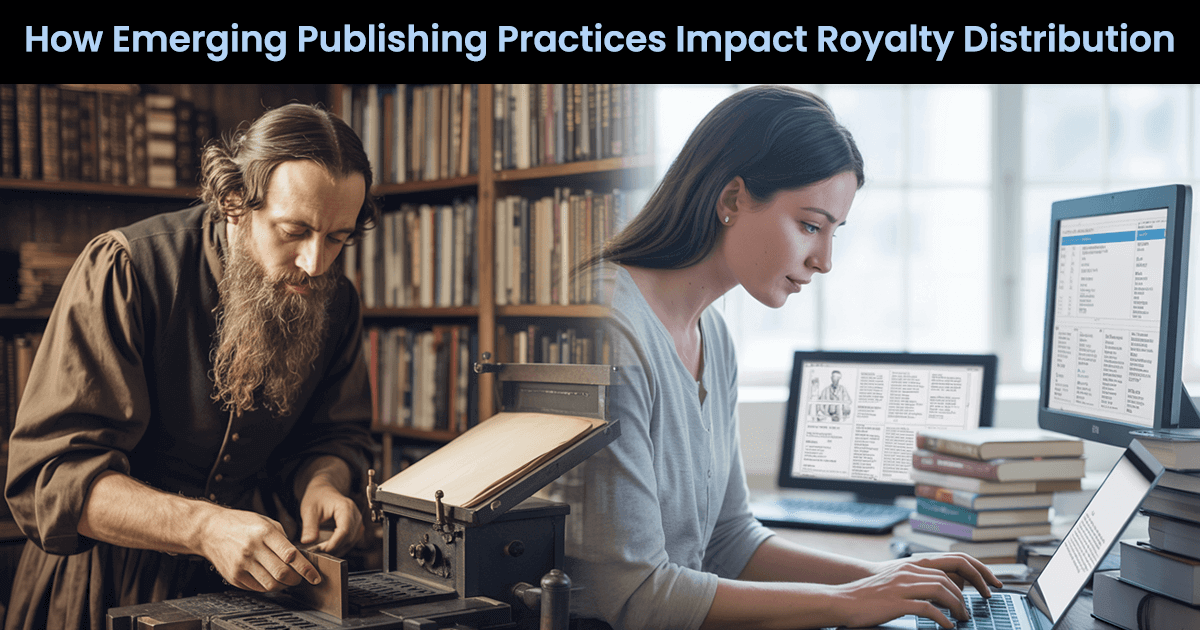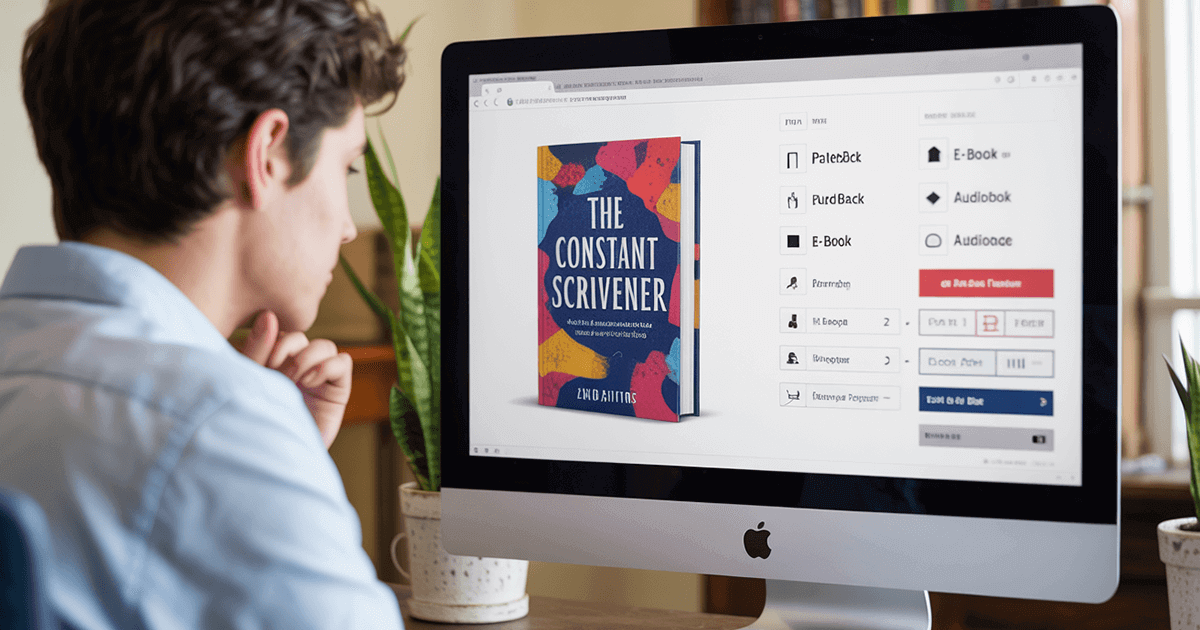How Emerging Publishing Practices Impact Royalty Distribution
For more than five centuries after the invention of the printing press, change in book publishing happened slowly. But since the late 20th century, it has come at breakneck speed. Technology and innovation have transformed just about every aspect of the way books are created, and made it simpler and faster than ever before to deliver content to a global audience.
We have also seen a revolution in how consumers purchase that content. In print alone, there has been surging interest in collectible special editions or formats with enhanced or bonus content. And printed books are now just one part of a publishing ecosystem that includes ebooks, audio, subscriptions and so much more.

Self-publishing, hybrid publishing, subscriptions, and bundles
The ease of creation has led to perhaps the most significant development of all: self-publishing. Anyone with access to basic software and an ISBN can now publish a book, and it has created a torrent of new releases. According to Bowker, the number of self-published titles is closing in on 3 million—double what it was a decade previously, and four times the number of traditionally published titles. In between these old and new models of production sits hybrid publishing, whereby publishers and authors share varying degrees of tasks, costs and risks. These emerging publishing practices are reshaping the book publishing industry’s traditional gatekeeping model.
Subscriptions have been another game-changing publishing trend. They have been a common model in scholarly publishing for a long time, but are now popular right across the spectrum. Consumers enjoy the convenience of all-you-can-read packages—or, in audio, all-you-can-listen, with streaming platforms having raised people’s expectations that they should be able to access unlimited listening in return for a set monthly fee.
Content is also no longer just restricted to the book in which it is bound. Chapter-level or bundled access has become the norm in some fields of publishing, and a slice-and-dice approach allows third parties to aggregate and sell content from multiple sources.
The AI revolution
Artificial intelligence is set to evolve these emerging publishing practices yet further. Generative AI is making it simpler by the day to produce, edit and refine content, while innovative new AI-powered translation and narration tools are dramatically reducing the time and cost involved in adapting books for foreign-language and audio editions respectively.
The upshot is that end-users have a widest ever variety of content to choose from, and a record number of ways in which to enjoy it. But for the publishers of that content, it has added numerous layers of complexities. They are not just preparing content for sale in print form: they are pushing it out into the world in a dizzying array of formats and channels. In many cases, the handling of emerging publishing practices like marketing, licensing, tracking sales and protecting copyright has become extremely laborious.

The new rules of royalties
In this new age of content consumption, one of the most intricate tasks of all relates to royalties. For a traditionally published book, it is still easy enough to calculate the share of sales that is due to the author or illustrator, because standard rates have emerged—like 10% for paperbacks or 15% for hardbacks. But royalty rates have had to be completely rethought on new digital formats, where creators and their agents tend to expect a higher cut of the earnings—frequently 25% to 50% in the case of ebooks.
The rise of hybrid publishing models has added more variables. When the balance of work between creator and publisher changes, how should royalties be apportioned? Where an author has handled the majority of the work, they might now take a 50% to 70% share, with the publisher keeping the rest. But for now, the lack of common standards highlights the need for hybrid-style publishers to provide clear and binding royalty agreements.
Working out the payments that are due to authors on revenue earned through subscriptions can be even more complicated. When the content that is being purchased is from multiple creators, dividing up the earnings is difficult. Other delivery models like streaming need their own royalty frameworks. While some patterns are emerging, publishers and creators are a long way from agreement on the appropriate breakdown of earnings. Click here to read more about royalty rates.
Face the Future of Royalties with Confidence
Royalty Automation to the Rescue
Don’t rely on a clunky old royalty system. MetaComet®’s Royalty Tracker® is the future proof solution you can rely on. Contact us to see how it works.
From complex to simple
This new world of multi-format distribution adds enormous complexity to royalty math. Emerging publishing practices have made it so that even when all the rates and terms are agreed and clearly defined, it’s inevitably difficult to process calculations when a single title is available as, for example, a hardback, paperback, ebook, audio download, stream, part of a subscription or bundled package and more. If these sums are being done manually on a format-by-format basis, it’s virtually impossible.
That is where tools like MetaComet®’s best-in-class royalty management solutions come in. By automating calculations they drastically reduce the time and stress spent on this aspect of publishing, aggregating royalties from sales in multiple formats, multiple delivery models and multiple territories.
MetaComet’s Royalty Tracker® has the capacity to handle unlimited contracts and sources, and adapts easily to the most sophisticated of terms and conditions. Importantly, it has the flexibility for publishers to add new sources of sales and change royalty rules whenever appropriate. It’s not just ready to handle the complex emerging publishing practices of today—it will keep up with whatever comes next.
MetaComet’s solutions can also help publishers meet the expectations of authors in the digital age. Most creators now expect to be paid electronically, and Royalty Tracker accommodates this by slotting seamlessly into the latest accounting and e-payment systems. Authors also expect real-time oversight of their performance, and MetaComet’s Royalty Portal provides it via on-demand, easy-to-access insights into sales and payments, and breakdowns of increasingly complex statements.
Publishing’s pace of change can be exhausting, and the only certainty about the future is that more transformation in practices lies ahead—but with the right infrastructure in place, publishers can navigate emerging publishing practices with confidence and be excited about the opportunities to come.
To discuss how MetaComet’s solutions meet the needs of publishers and creators in the fast-changing publishing landscape, contact the team.

David Marlin is the President and Co-Founder of MetaComet® Systems, a prominent provider of royalty automation tools. Since founding the company in 2000, David has spearheaded the development of a suite of best-in-class systems that effectively facilitate royalty processes for nearly 200 publishers. David has also served as the chair for The Book Industry Study Group’s Rights Committee and Digital Sales Committee.
Before establishing MetaComet Systems, David served as a technology consultant for renowned publishers, collaborating with notable companies such as Random House, Penguin, HarperCollins, Holtzbrinck, Macmillan, Scholastic, Time Warner, and many others. David holds both an MBA and a BA from Columbia University in New York.
Contact Us
"*" indicates required fields

